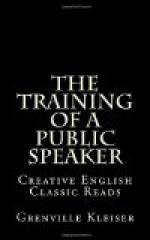THE ORDER OF THE NARRATION
I am not of the opinion of those who think that the facts ought always to be related in the same order in which they happened. That manner of narration is best which is of most advantage to the cause, and it may, not improperly, call in the aid of a diversity of figures. Sometimes we may pretend that a thing has been overlooked, so that it may be better exprest elsewhere than it would be in its own order and place; assuring the judges at the same time that we shall resume the proper order, but that the cause in this way will be better understood. Sometimes, after explaining the whole affair, we may subjoin the antecedent causes. And thus it is that the art of defense, not circumscribed by any one invariable rule, must be adapted to the nature and circumstances of the cause.
It will not be amiss to intimate that nothing enhances so much the credibility of a narration as the authority of him who makes it, and this authority it is our duty to acquire, above all, by an irreproachable life, and next, by the manner of enforcing it. The more grave and serious it is, the more weight it will have. Here all suspicion of cunning and artifice should, therefore, be particularly avoided, for the judges, ever distrustful, are here principally on their guard, and, likewise, nothing should seem a pure fiction, or the work of study, which all might rather be believed to proceed from the cause than the orator. But this we can not endure, and we think our art lost unless it is seen; whereas it ceases to be art if it is seen.
DIVISION AND ARGUMENT
Some are of the opinion that division should always be used, as by it the cause will be more clear and the judge more attentive and more easily taught when he knows of what we speak to him and of what we intend afterward to speak. Others think this is attended with danger to the orator, either by his sometimes forgetting what he has promised, or by something else occurring to the judge or auditor, which he did not think of in the division. I can not well imagine how this may happen, unless with one who is either destitute of sense or rash enough to plead without preparation. In any other respect, nothing else can set a subject in so clear a light as just division. It is a means to which we are directed by the guidance of nature, because keeping in sight the heads on which we propose to speak, is the greatest help the memory can have.
THE MISTAKE OF TOO MANY DIVISIONS
But if division should seem requisite, I am not inclined to assent to the notion of those who would have it extend to more than three parts. Indeed, when the parts are too many, they escape the judge’s memory and distract his attention; but a cause is not scrupulously to be tied down to this number, as it may require more.




